From N16 to SW9: How London’s Urban Farmers are Cultivating the City
From the UK’s first acquaponic vertical farm to a bee apiary that spans the city’s gardens and rooftops, a new generation of farmers are transforming London into an urban acreage.
From N16 to SW9: How London’s Urban Farmers are Cultivating the City
From the UK’s first acquaponic vertical farm to a bee apiary that spans the city’s gardens and rooftops, a new generation of farmers are transforming London into an urban acreage.
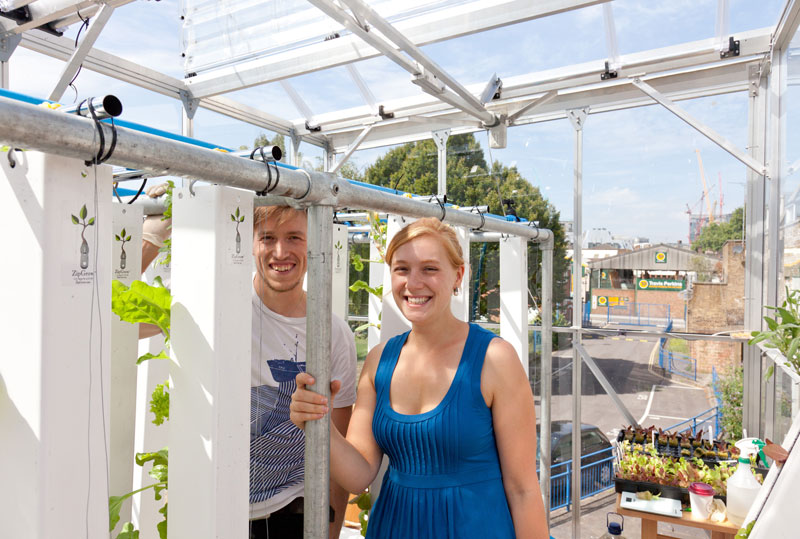
Cultivating derelict and under-utilized spaces, urban beekeepers, growers, and brewers are leading a green revolution in one of Europe’s most densely populated cities. Although in its infancy, young entrepreneurs with a commitment to sustainable growing and food production are finding opportunities to grow food commercially. From the UK’s first acquaponic vertical farm to a bee apiary that spans the city’s gardens and rooftops, we look at three businesses who are leading the way.
GrowUP Urban Farms
Former management consultant and a graduate of Climate-KIC, Kate Hofman believes to produce food in our cities we simply need to find the right products to grow in the right places. “This is why we think acquaponics and vertical farming is the right combination,” she says. “You are making the most effective use of space, while looking at food production holistically.”
Now Hofman is CEO of GrowUp Urban Farms, a sustainable farming business she and her business partner Tom Webster co-founded in 2013. Using aquaculture (fish farming) and hydroponics (cultivating without soil), they grow herbs, salads, and fish. In this agrisystem, the water is cycled through fish tanks to the plants and back again. The fish provide fertilizer for the plants that in turn filter the water for the fish.
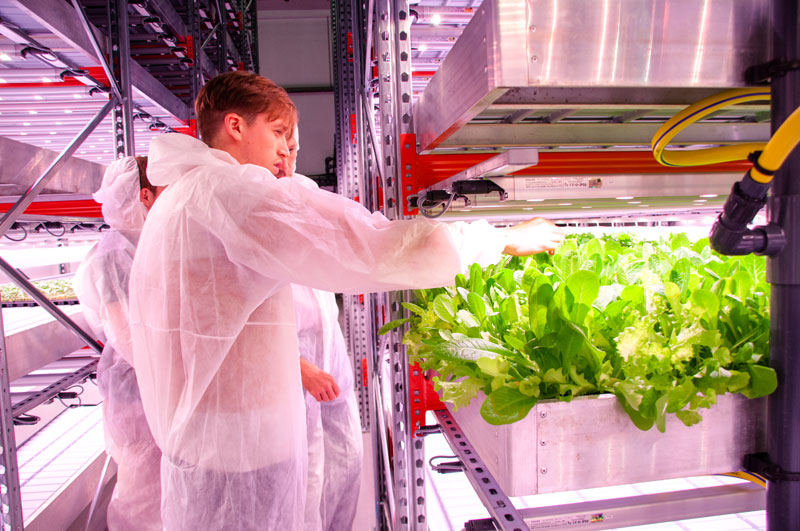
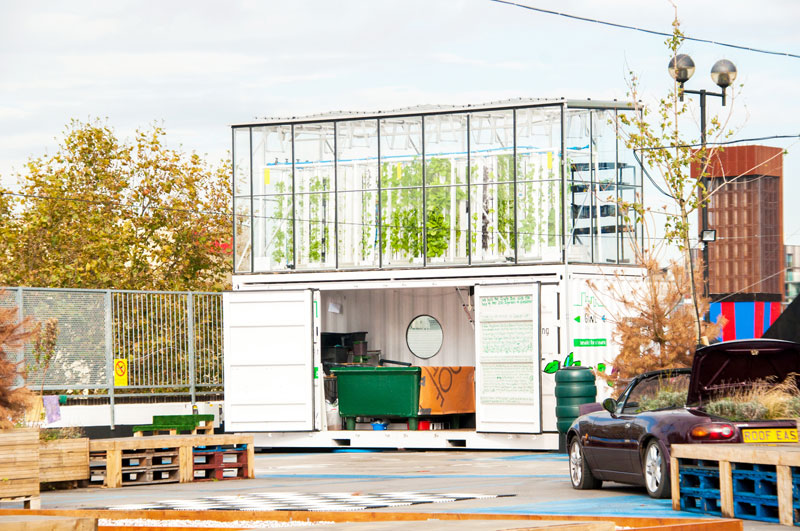
An industrial estate in east London would seem an unlikely site for such an enterprise; yet, it is this innovative approach that defines their business. “It is really important to reconnect people who live in cities with how their food is produced and that means growing food close to where people live. This is why growing in warehouses and city centers is such a viable option,” says Hofman.
Launched with a crowd-funding campaign on Kickstarter, the UK‘s first commercial aquaponic vertical farm started as The GrowUP Box – a converted shipping container. However, their vision for the business was always more ambitious than this prototype, with the duo raising £1.2 million ($1.7 million USD) last year to build Unit 84. Currently at 40 percent capacity, this 6,000-square-foot warehouse will be fully operational by April 2016, when they will reach their target of growing 20,000 kilograms of herbs and salads, and 4,000 kilograms of fish a year.
With the desire to have a social and environmental impact, Hofman describes their business as one “committed to feeding people in cities in a way that is positive for communities and the environment, today and in the future.” They will do this by creating local jobs, selling 25 percent of GrowUP produce locally, and working with customers to plan supply. An onsite education center will also be added, so “we can educate people about how food is produced, what it takes to produce it, and what it means to farm sustainably.”
Barnes & Webb
Urban beekeepers and farmers, Chris Barnes and Paul Webb have some of the best views of London, whether they’re looking across the River Thames or the rooftops of Shoreditch. Whereas most Londoners would think real estate, Barnes & Webb think of something altogether different. “When we‘re on a rooftop looking around we often see places that would be great for another hive,” Webb says. “As the city gets more densely populated, rooftops are massively under-utilized. We need to cultivate more unused space in London for growing.”
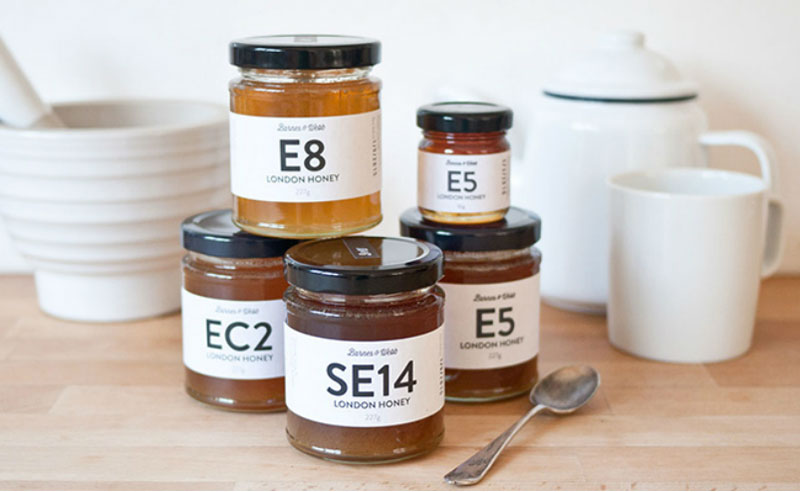
Since 2013, the duo have been installing and renting beehives across London rooftops and gardens, maintaining 40 hives throughout the season, and sharing between 20 and 50 percent of the honey collected depending on the rental fee.
With only 15 percent of all honey consumed in the UK being produced locally, Barnes & Webb offer an alternative. Their postcode honey is named after the area of London from which it is collected, with each batch reflecting the diversity and complexity of the local nectar. As Webb explains: “Our N16 honey last year was very light and very floral. You could almost taste the flowers in that one. We have had other honeys like the one in Putney, which was very dark, richer and toffee-flavored in its first year.”
Barnes & Webb sees their role as urban beekeepers as an important environmental and social one. All their honey is filtered by hand and sold in shops as close to the hives as possible, sometimes within walking distance. In 2016, they will sponsor their first community hives in underprivileged areas of London. They are keen to engage locals in caring for the bees as well as encourage the planting of pollinator gardens. The benefits according to Webb are: “We are giving people an active connection to a place, supporting local businesses and providing a much more personal relationship with food.”
Brixton Brewery
“We reckoned that every great neighborhood deserves a great brewery, and we wanted to bring one to ours,” says Jez Galaun of Brixton Brewery, the microbrewery he founded in 2012 with Mike Ross.
Today from two converted railway arches near the center of town, Brixton Brewery produces a range of beers from pale ales to robust stouts. Everything is brewed on site with the team delivering to local restaurants and bars using a porter‘s trolley. Even its beers are named after local landmarks. “It was very conscious to be this local,” says Galaun. “From the beginning, it was something that we really built into our ethos as a business: to be local, to support local causes, and supply local businesses.”
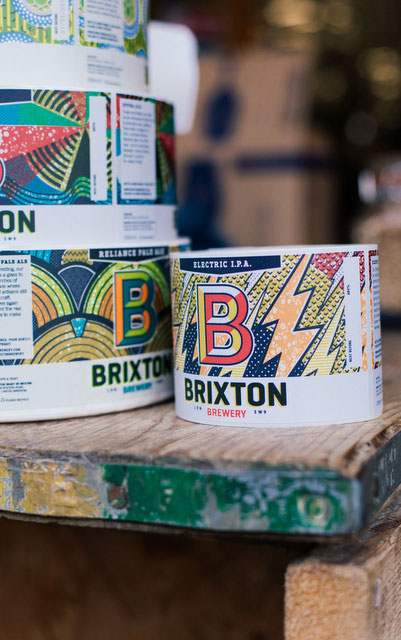
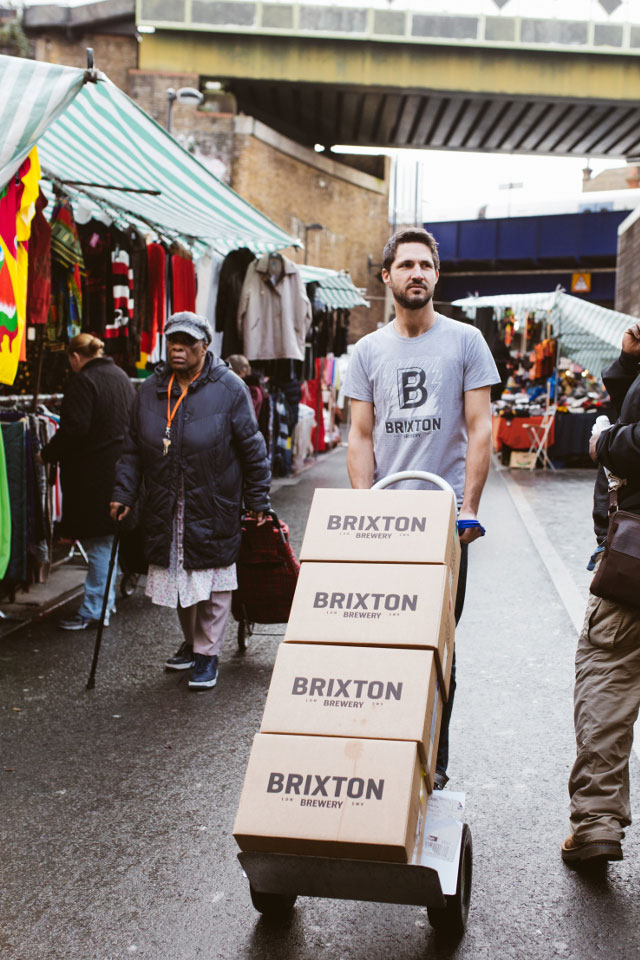
One such cause is the Brixton Beer Company. This initiative of City Farmers encourages people to grow hops in community gardens and backyards. Brixton Brewery creates a limited version of its Effra Ale using its share of the harvest. In September, hops arrive fresh at the brewery where they are picked by hand, including the ones that Galaun brings from his own garden. More than 1,000 litrers are produced with the hops giving the ale “a fresh, verdant, grassy type of flavor”.
Despite its commercial success, Brixton Brewery remain staunchly local, loyal to the community that has supported it. “We are in a growing market but we want to expand in the right way and stick to our principles and values,” Galaun says. “It would be wrong of us to spread ourselves too thinly and not to be able to supply the people who have supported us from the beginning.”
Follow us

This work is licensed under a Creative Commons Attribution-NoDerivatives 4.0 International License.
Want to republish a Modern Farmer story?
We are happy for Modern Farmer stories to be shared, and encourage you to republish our articles for your audience. When doing so, we ask that you follow these guidelines:
Please credit us and our writers
For the author byline, please use “Author Name, Modern Farmer.” At the top of our stories, if on the web, please include this text and link: “This story was originally published by Modern Farmer.”
Please make sure to include a link back to either our home page or the article URL.
At the bottom of the story, please include the following text:
“Modern Farmer is a nonprofit initiative dedicated to raising awareness and catalyzing action at the intersection of food, agriculture, and society. Read more at <link>Modern Farmer</link>.”
Use our widget
We’d like to be able to track our stories, so we ask that if you republish our content, you do so using our widget (located on the left hand side of the article). The HTML code has a built-in tracker that tells us the data and domain where the story was published, as well as view counts.
Check the image requirements
It’s your responsibility to confirm you're licensed to republish images in our articles. Some images, such as those from commercial providers, don't allow their images to be republished without permission or payment. Copyright terms are generally listed in the image caption and attribution. You are welcome to omit our images or substitute with your own. Charts and interactive graphics follow the same rules.
Don’t change too much. Or, ask us first.
Articles must be republished in their entirety. It’s okay to change references to time (“today” to “yesterday”) or location (“Iowa City, IA” to “here”). But please keep everything else the same.
If you feel strongly that a more material edit needs to be made, get in touch with us at [email protected]. We’re happy to discuss it with the original author, but we must have prior approval for changes before publication.
Special cases
Extracts. You may run the first few lines or paragraphs of the article and then say: “Read the full article at Modern Farmer” with a link back to the original article.
Quotes. You may quote authors provided you include a link back to the article URL.
Translations. These require writer approval. To inquire about translation of a Modern Farmer article, contact us at [email protected]
Signed consent / copyright release forms. These are not required, provided you are following these guidelines.
Print. Articles can be republished in print under these same rules, with the exception that you do not need to include the links.
Tag us
When sharing the story on social media, please tag us using the following: - Twitter (@ModFarm) - Facebook (@ModernFarmerMedia) - Instagram (@modfarm)
Use our content respectfully
Modern Farmer is a nonprofit and as such we share our content for free and in good faith in order to reach new audiences. Respectfully,
No selling ads against our stories. It’s okay to put our stories on pages with ads.
Don’t republish our material wholesale, or automatically; you need to select stories to be republished individually.
You have no rights to sell, license, syndicate, or otherwise represent yourself as the authorized owner of our material to any third parties. This means that you cannot actively publish or submit our work for syndication to third party platforms or apps like Apple News or Google News. We understand that publishers cannot fully control when certain third parties automatically summarize or crawl content from publishers’ own sites.
Keep in touch
We want to hear from you if you love Modern Farmer content, have a collaboration idea, or anything else to share. As a nonprofit outlet, we work in service of our community and are always open to comments, feedback, and ideas. Contact us at [email protected].by Fiona Symington-Mitchell, Modern Farmer
February 3, 2016
Modern Farmer Weekly
Solutions Hub
Innovations, ideas and inspiration. Actionable solutions for a resilient food system.
ExploreExplore other topics
Share With Us
We want to hear from Modern Farmer readers who have thoughtful commentary, actionable solutions, or helpful ideas to share.
SubmitNecessary cookies are absolutely essential for the website to function properly. This category only includes cookies that ensures basic functionalities and security features of the website. These cookies do not store any personal information.
Any cookies that may not be particularly necessary for the website to function and are used specifically to collect user personal data via analytics, ads, other embedded contents are termed as non-necessary cookies.